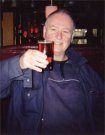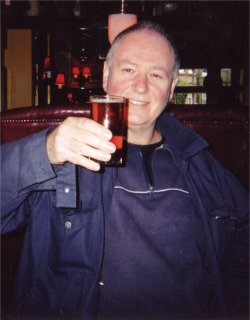AUSTRALIAN POETS AT WORK SERIES 2
Kris Hemensley
Selected by Coral Hull

[Above] Photo of Kris Hemensley by Bernard Hemensley, 2005.
CH: Talk about a piece of visual art that has touched you.
KH: From teens & twenties through to my fifties & now sixties there's always been what James Schuyler, in respect of the New York poetry scene, called the "floods of paint in whose crashing surf we all
scramble." So it's difficult for me to isolate a particular work of art. Easier, perhaps, to recall particular exhibitions or the first time one encountered a particular artist. In Amsterdam in 1965, for example, I saw the Van Gogh collection in close proximity to wonderful, chaotic abstract work of the contemporary Dutch artist Appel. You could say that here were two kinds of expressionism, the best part of a century apart, equally vivid & exciting. Although history (art history at least) informed some of the pleasure &
impact of the Van Gogh, it was the immediacy & the energy of the works that affected me. They remained important visual references for me for years. When I say visual I also mean emotional. And topographical -- paintings for me are places whether or not they depict them. One might vary John Berger's famous phrase and say the art most important to me is a way of being.
CH: Why is poetry important to you?
KH: As a reader & writer I regard poetry as the most attractive form of lyrical expression within literature. (Art & music obviously have similar qualities.) The poem reveals the historical even when intensely personal. It has the power by dint of shape & sound to insinuate the transcendent even as it deals the real. Poetry is the well-spring of all literary writing despite the fact that poets occasionally look over the shoulders of novelists & essayists. Poetry is a form of research even when one thinks one's writing what one knows : it's always an adventure ...
CH: Talk about an incident that has astonished you
KH: The events of life & death aside (astonishment at which reveals one's alienation from what used to be considered natural), I'm perpetually astonished! The "wow!" factor on an hourly basis! There've been aspects of the natural world like whale-spout, kookaburra's laughter, the S W Victorian coast's limestone " Apostles" ... I'm astonished by synchronicity even though I accept & expect it -- the web of connections... The realization of time passing, of time having passed : that it was one year, four years, twenty, a lifetime since this or that occurred ...
CH: Do you believe that art can transform the world?
KH: Certainly I recognize instances of personal & social transformation just as I believe in the principle & process of creation : we are part of the unfolding of what-is ... I dont, however, believe any of this can be codified (art isn't a chemical formula) nor that any particular art-work is transformative in & of itself ... I think art & literature are elements of transformation, parts of the process ...
CH: What advice do you have for young Australian poets?
KH:
Think "poet", not "young"! Naturally, the seven ages impart subject-matter & tone, but as I used to teach: assume the subject,
attend to the language. I began correcting that for my own poetry in the late 1980s. I fear I'd assumed the subject to the degree
of practically cancelling the life-world. It's an amusing thought for me that any number of poets were taking up "language-centred"
writing in the late 1980s when I was moving away from it! I'd also advise vocation rather than career even if one regards it as a
profession. And I'd probably advise seriousness rather than professionalism.
CH: What would you do if you won a million dollars?
KH: I'd absolutely secure the viability of Collected Works Bookshop. I'd assist family & friends in their temporary hardships and with their costlier creative projects. I'd continue much as I am but with custom-made t-shirts & jeans: an end to the frustration of shopping for clothes that fit or agree with me!
CH: What is your favourite season and why?
KH:In England it is Spring because Spring follows Winter by which time one's hanging out for some sun, for the plants & flowers to bud & leaf & blossom, for the birds to resume their chatter & song. But my memory is based on pre- climate-change experience! It seems that Winter is rather mild nowadays in the South & West of England. The sharp contrast I recall no longer pertains. In Melbourne I like the first warmth of Spring after the colder months, and I like the cooler but yet sunny Autumn after the heat & humidity of Summer. Melbourne & Victorian Wintertime thrills me as a prospect though I also huddle in my cottage by the fire at its coldest. I cannot imagine living in a place where there aren't seasons, whether the Northern European variety or the Victorian.
CH: Who are you favourite Australian poets?
KH:
An invidious question especially since I've doubted my own qualification as an "Australian" poet in recent times although I've lived here for most of 40 years. I like dozens of poets, read & admire numerous poems or, crucially, bits of them. Probably being a writer of poetry, as well as a reader, affects one's response to this question. Every year or so there's a new batch of interesting poets & poems. As years go by the work of poets one admires changes. You could say there have been poets & poems of particular times I've enjoyed or favoured. Despite an internationalist perspective I've always enjoyed poets of locality, especially my own. So I relish being amongst the Melbourne poets. They're all my favourite! And from Melbourne it's out and into the world!
| |
... to come away with Hesiod
to come away with Hesiod
and leave the rock as though to rocks
the tree to trees and dwell on other things
imagine the injunction
to leave the mint to its own devices
among the dust & stones in the shadow
of rocks or tree-roots hard as rocks
imagine poems like tended mint
or poems like wildest mint which survives
the oblivion of feckless gardeners
until plucked by knowing fingers
after the fiercer heat's abated
imagine poems left to their own devices
as poets gorge on air & airy thoughts
& figures -- the thought sobers me
to the bone of a sobriety earned
at the expense of the airiness Hesiod
was commissioned to name
but who wouldn't sieze a staff of bay
or ash or gum and trade common or
garden cough for lungs full of song
taking the world in one's stride
careering towards heaven?
... Three in the heat
Three in the heat
up from the Creek
he fossicks they trail
close to his feet
God's own menage
whom everyone's disowned
He bred the mother
and trained her
she trained
the one pup he kept
of her litter
Human society
he gave away
when he became
the boss of dogs
He patrols the hours
instead of the years
the steward of powers
hatched in his scrap-metal
eyrie overhanging the stretch
of street the alsations scan
on behalf of their one & only man
OUT THE WINDOW (chez Michel Deguy)
twice i looked
twice
out the window
into the sunlight
i was blurry eyed like Modigliani
the green tin shared fence
was a mirror
like Cezanne
Modigliani
Cezanne
i was the painter of the new day
but did i say i'd just woken up?
i rose tired & aching
pirouetting upon habit
life pawned a dozen times
like a Giacometti man
i lifted the bamboo blinds
twice i looked
twice
out the window
Modigliani
Cezanne
Giacometti
voice that says you're forgiven
forgiven for not believing in heaven
forlorn night dissolved like ice does
twice i looked
twice
FIVE CAIRNS
i
when you sleep on a mountain
a world grows beside you
you wake to find the stones
have become a flock of sheep
ii
when you sleep in the world
a mountain grows beside you
you wake to find your flock
has turned to stone
iii
you dreamt you'd lived your whole life
minding sheep
but all the while it was sun wind & rain
bleaching scouring honing their final forms
iv
if this is the body --
a mountain's abandoned shed --
what is the shape of the soul?
v
you dreamt you were alive
as the elements combed your bones
Acknowledgments to: Jacket (Australia), Salt Lick Quarterly (Australia). |
About the Poet Kris Hemensley

|
Kris Hemensley was born in England in 1946; saw Australia as sailor in 1965, emigrated in 1966. Lived in Melbourne, and in Dorset/England since late 80s. Books of poetry include an early selected poems, Domestications (1974); The Poem of the Clear Eye (1975); A Mile From Poetry (1979). Many chapbooks since 1968 published in Australia & England. Included in several anthologies including, Applestealers (1974), The New Australian Poetry (1978), Australian Verse (1998). Writes fiction & has been a playwright with stage & radio productions of his work since 1967. A commentator on & reviewer of poetry since the 1970s. Member of collective which ran Collected Works Bookshop in Melbourne since 1984 and its director since the group dispersed about 1992. Received Christopher Brennan Award in 2005. Was invited by Betty Burstall to instigate the Poets' Workshop readings at La Mama theatre in 1968. Edited his own magazines from 1968 to 1985. Taught creative-writing in the adult education & TAFE sector between 1976 & 1987. Has been on writing organisation's boards, committees, & literary juries since the 1960s. |
[Above] Photo of Kris Hemensley by Bernard Hemensley, 2005.
I Next I
Back I
Exit I
Thylazine No.12 (June, 2007) |



